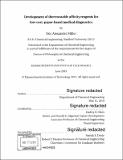| dc.contributor.advisor | Hadley D. Sikes. | en_US |
| dc.contributor.author | Miller, Eric Alexander. | en_US |
| dc.contributor.other | Massachusetts Institute of Technology. Department of Chemical Engineering. | en_US |
| dc.date.accessioned | 2019-11-12T17:38:37Z | |
| dc.date.available | 2019-11-12T17:38:37Z | |
| dc.date.copyright | 2019 | en_US |
| dc.date.issued | 2019 | en_US |
| dc.identifier.uri | https://hdl.handle.net/1721.1/122849 | |
| dc.description | Thesis: Ph. D., Massachusetts Institute of Technology, Department of Chemical Engineering, 2019 | en_US |
| dc.description | Cataloged from PDF version of thesis. | en_US |
| dc.description | Includes bibliographical references. | en_US |
| dc.description.abstract | The timely diagnosis and treatment of disease in resource-constrained settings requires the development of robust point-of-care (POC) diagnostics, which provide accurate results and can be employed by users with minimal medical training and limited access to basic infrastructure. One of the most common POC diagnostic formats is the immunochromatographic rapid diagnostic test, which traditionally uses nitrocellulose-immobilized IgG antibodies as binding proteins for the capture of disease biomarkers from patient samples. However, these antibodies are expensive to produce and structurally complex, and are prone to thermal denaturation. In contexts where continuous cold chain storage may be infeasible, the resulting loss in binding activity can manifest as diminished assay sensitivity, leading to adverse clinical outcomes and eroding patient trust in the diagnostic format. | en_US |
| dc.description.abstract | In the interest of replacing diagnostic antibodies with a more cost-effective, robust class of binding proteins, this thesis explores the development of thermostable affinity reagents based on the hyperthermophilic scaffold protein rcSso7d. Given its native microbial host, minimalist structure, and high wild-type melting temperature (98°C), rcSso7d represents a viable alternative to antibodies in in vitro POC assays. To assess the applicability of the rcSso7d scaffold in this context, protein engineering techniques were used to rapidly select analyte-specific binding variants from a yeast surface display library of >109 members. A high-affinity rcSso7d binder was identified, produced in high yield in a bacterial host, and readily purified in a single chromatographic step. | en_US |
| dc.description.abstract | The in vitro activity and thermal stability of this engineered binder were characterized in the context of a low-cost, paper-based assay, and significant improvements in stability and production economics were observed for rcSso7d-based assays, relative to assays featuring a representative antibody reagent. Additionally, general strategies were developed to improve the diagnostic performance of paper-based assays employing rcSso7d-based reagents. In one instance, chimeric protein constructs in which rcSso7d variants are fused to a cellulose-binding domain were found to bind to unmodified cellulose in an oriented fashion and with high efficiency. This substrate anchoring approach permits the rapid, high-density immobilization of the rcSso7d species in paper-based assays, and yields significant sensitivity enhancement by enabling both the depletion of the soluble analyte from the sample, and the processing of large sample volumes within clinically relevant timescales. | en_US |
| dc.description.abstract | Detection reagents incorporating rcSso7d binders were also developed, using novel fusion constructs which enabled in vivo labelling while preserving analyte binding activity. These techniques were applied in the context of a urine-based tuberculosis biomarker, and may one day permit the development of multiplexed assays targeting a suite of these analytes. Such a development would enable point-of-care diagnostic testing without requiring the production of sputa, facilitating disease detection in otherwise inaccessible patient populations (e.g. children under five, the elderly, and immunocompromised patients). | en_US |
| dc.description.sponsorship | "People who have financially supported this thesis: the NIH Biotechnology Training Program, the Tata Center for Technology and Design, the Deshpande Center, the Sandbox program, and the Singapore- MIT Alliance for Research and Technology" | en_US |
| dc.description.statementofresponsibility | by Eric Alexander Miller. | en_US |
| dc.format.extent | 276 pages | en_US |
| dc.language.iso | eng | en_US |
| dc.publisher | Massachusetts Institute of Technology | en_US |
| dc.rights | MIT theses are protected by copyright. They may be viewed, downloaded, or printed from this source but further reproduction or distribution in any format is prohibited without written permission. | en_US |
| dc.rights.uri | http://dspace.mit.edu/handle/1721.1/7582 | en_US |
| dc.subject | Chemical Engineering. | en_US |
| dc.title | Development of thermostable affinity reagents for low-cost, paper-based medical diagnostics | en_US |
| dc.type | Thesis | en_US |
| dc.description.degree | Ph. D. | en_US |
| dc.contributor.department | Massachusetts Institute of Technology. Department of Chemical Engineering | en_US |
| dc.identifier.oclc | 1126283858 | en_US |
| dc.description.collection | Ph.D. Massachusetts Institute of Technology, Department of Chemical Engineering | en_US |
| dspace.imported | 2019-11-12T17:38:36Z | en_US |
| mit.thesis.degree | Doctoral | en_US |
| mit.thesis.department | ChemEng | en_US |
